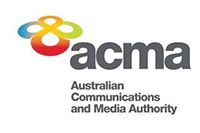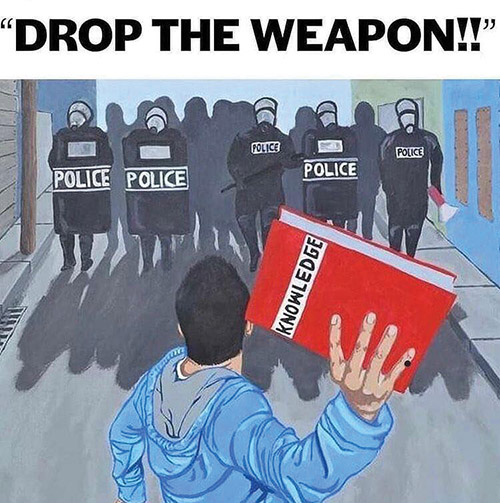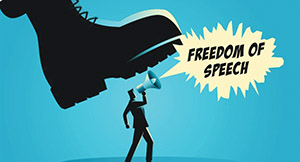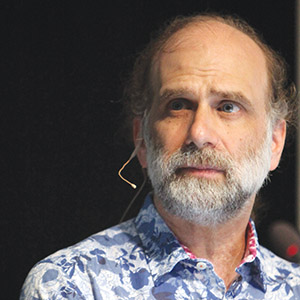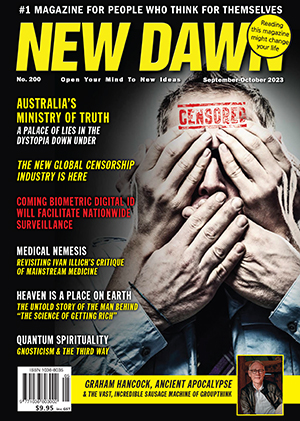From New Dawn 200 (Sept-Oct 2023)
What happens when the government itself becomes the country’s greatest purveyor of misinformation and disinformation – gaslighters of their entire populations?
And that same government is hell-bent on censoring the truth?
That is exactly what has happened, and is happening, in Australia.
Long known as the most illiberal of all Western democracies – as the greatest surveiller, manipulator and oppressor of its own population of any so-called democracy – Australia stepped straight off the cliff into a totalitarian abyss during the Covid era. And made headlines around the world for all the wrong reasons.
Without the right to freedom of assembly or freedom of speech in its Constitution, and without a Bill of Rights, the despotic conduct of Australian governments has run out of control, accelerated first by the overreach of the terror response post the September 11 attacks in the United States in 2001, and then by the heavy-handed government response to the Covid panic beginning in early 2020. Aided and abetted by a legacy media taken hostage by its funding sources, principally the government, either through direct grants, tax right-offs, or threats to withdraw advertising if they step out of line.
Not content with having a controlling hand in all the country’s mainstream media and untrammelled by common sense or any inconvenient social conscience, the Australian government is now introducing a new and entirely counterproductive level of censorship unseen at any time in the nation’s history.
On 25 June 2023, on what – appropriately – marked 120 years since George Orwell’s birth, the Australian government released an “Exposure Draft” of its The Communications Legislation Amendment (Combating Misinformation and Disinformation) Bill 2023, for public and institutional comment.1
The public had until 6 August 2023, later extended by a fortnight, to make submissions to a government Inquiry on the Bill, which would give the media regulator, the Australian Communications and Media Authority (ACMA), yet greater powers. Private submissions will not be published.
Once a paper tiger, an obscure bureaucratic backwater, ACMA has grown dramatically in power over recent years and now has the power to control all online public discourse.
ACMA wields power over Australia’s entire communications spectrum, including television, radio, newspapers, digital platforms, and the internet.
The new laws include content aggregation services, connective media services, media sharing services and, somewhat broadly, “a digital service specified by the minister.” Targets include websites that collate information and present it to end users, self-produced information, search engines, instant messaging services, social media platforms and podcasting services.
Many Laws “in this space”
There have been flotillas of government overreach legislation launched on the public since the early days of the millennium; so many laws “in this space,” an expression beloved by bureaucrats, that it is hard to keep track. One piece of Malcolm Turnbull-era legislation the general public has never heard of is the innocuous-sounding Defence Trade Controls Act, a poorly drafted piece of catch-all legislation. Interpreted literally, it could make the use of mobile phones or internet banking illegal, both, obviously, using encryption.2
As usual, the government has only been going through the motions of a public inquiry and has zero interest in what the public thinks. The tight deadlines, the complexity of making a submission – well beyond the average punter – the lack of any genuine public information campaign and town hall meetings are all designed to ensure the voices of ordinary people are eliminated from the process.
The last people this government wants to hear from are its many incensed citizens, offended by the censorship they have repeatedly endured, at the Australian government’s request, on American-owned social media platforms including Facebook, Instagram and Twitter.
Subjects which the government has seen fit to censor or deplatform or outright ban have included Christian websites, opponents of mass immigration, critics of the current LGBTQIA+ obsessions, and in the past three years, thousands of often factually correct communiques on the safety and efficacy of vaccines, the effectiveness of masks and lockdowns, and the views of world medical experts dissenting from the Big Pharma line. Bill Gates, of course, is a protected animal online. Protected with our money. Not for us. And not for the public good. But purely for the benefit of the world’s elites.
All this is being done under the rubric of keeping Australians safe and under the auspices of the Orwellian named “eSafety Commissioner,” a World Economic Forum (WEF) acolyte now acting as the country’s Chief Censor, Julie Inman Grant.
Touted as the world’s first government regulatory agency committed to keeping its citizens safer online, there’s a reason why every other country on Earth has avoided going down this path. Censoring your citizens builds enormous stressors in the system, rapidly leading to chaos, state control, and a totalitarian nightmare.
Julie Inman Grant was appointed by the conservatives in 2017 when an already intensely disliked Prime Minister Malcolm Turnbull dominated the political stage and took every opportunity possible to get himself on the nightly news.
Turnbull’s Totalitarian State Measures
Before becoming Prime Minister, Turnbull headed the Australian arm of the obscenely wealthy financial group Goldman Sachs, one of whose specialties is the creation of new markets, particularly renewables, an agenda Turnbull pursued with great diligence and which is now being equally diligently pursued by the Labor Party. Always follow the money. In this case the money of Goldman Sachs, which Turnbull re-joined after leaving politics.
As The Australian Financial Review describes the firm: “Its occasionally dodgy reputation among the public is outweighed by the deference it commands in circles of power. The network. The platinum Rolodex. Rich people who help powerful people get rich, and powerful people who make rich people powerful. It all stems from a culture of breathtaking exclusivity.”3
Malcolm Turnbull passed into law some of the most anti-democratic, anti-free speech anti-journalist legislation Australia, indeed the world, had ever seen. Under his watch, journalists became Persons of Interest under the Australian Security and Intelligence (ASIO) Act. He introduced Journalist Information Warrants, meaning the authorities can legally sweep all of a journalist’s communications. Created without any consultation with the industry, the legislation means if perchance a journalist discovers he, she, they, or them, discover they are the subject of such a warrant and publicises the fact, they can be sent to jail.4
As former Inspector General of Intelligence and Security Margaret Stone pointed out publicly, it is possible to be arrested and jailed for five years for breaching orders you did not even know existed in Australia.
It also became legal under Turnbull for the intelligence agencies to detain ten-year-olds and hold them incommunicado for a fortnight, without access to their families or to a lawyer. If a concerned family publicised the fact, they also face jail.5
Equally, under the Stasi chambers of anti-corruption commissions, a journalist can be hauled before a Commission and forced to reveal their sources. If they fail to comply, they can be jailed, and if they so much as tell a family member, a friend, a lawyer, or their own union that they have been thus summoned, they can also be jailed for up to two years.
That’s not democracy. That’s a totalitarian state.
The WEF & Our New eSafety Commissioner
It is no surprise that back in 2017 the fully committed globalist Malcolm Turnbull, with his extreme hostility to the profession of journalism and thereby to free speech, was responsible for the appointment of one Julie Inman Grant, the so-called eSafety Commissioner now more than willing to censor her fellow Australians.
Easy to find online is her 2022 call to recalibrate what we understand to be free speech at the World Economic Forum, an increasingly reviled organisation whose dystopian vision of humanity’s future has provoked widespread criticism. Any notion of a modern democracy being “Of the people for the people by the people” has long been dispensed with under the tutelage of the caricature of an evil despot, WEF head Klaus Schwab.
A contempt for the views and indeed the lives of ordinary people pervades everything the WEF does and is on full display at their annual meeting in Davos, Switzerland, frequented by some of the wealthiest, and some would argue most ruthless, dishonest, and unpleasant individuals on Earth.
“We are finding ourselves in a place where we have increasing polarisation everywhere,” Ms Grant told a WEF Forum in 2022. “Everything feels binary when it doesn’t need to be. I think we are going to have to think about a recalibration of a whole range of human rights that are playing out online, from the freedom of speech to the freedom to be free from online violence. Or the right of data protection to the right to child decency.”6
Right, that makes sense.
Ms Grant’s biography reads like a holy writ of horror, a long dance with the world’s worst corporate entities, bookended by the rapid expansion of her powers which have made her the country’s unelected Chief Censor.
Reappointed for a five-year stint just before last year’s election, she has been fervently embraced by the so-called “progressives” of the left, whose desire to censor the views of ordinary Australians is outdoing even their censorious predecessors.
The World Economic Forum records: “Julie has extensive experience in the non-profit and government sectors and spent two decades working in senior public policy and safety roles in the tech industry at Microsoft, Twitter and Adobe. The Commissioner’s career began in Washington DC, working in the US Congress and the nonprofit sector before taking on a role at Microsoft. Julie’s experience at Microsoft spanned 17 years, serving as one of the company’s first and longest-standing government relations professionals, ultimately in the role of Global Director for Safety & Privacy Policy and Outreach. At Twitter, she set up and drove the company’s policy, safety & philanthropy programs across Australia, New Zealand & Southeast Asia.”
Translation: Ms Grant worked closely with Bill Gates, whose devastating role promoting unsafe, ineffective, and highly profitable “vaccines” during the Covid era has left him as a discredited and widely despised figure. She also worked with Twitter during the height of its suppression of freedom of speech at the request of American military and intelligence agencies.
At the height of government-propelled Covid hysteria, the World Economic Forum notes, “Julie oversaw significant increases in the eSafety office’s budget, increased staffing levels and launched the global Safety by Design initiative. As Commissioner, she has led work to stand up novel and world-first regulatory regimes under the new Online Safety Act 2021, with implementation of a sweeping new set of reforms beginning on 23 January 2022.”7
Well, that’s reassuring!!
The WEF also nominated Ms Grant as one of their so-called Agile 50: The World’s 50 Most Influential People Revolutionising Government. It says: “This list seeks to laud those politicians, civil servants and entrepreneurs driving agility in governments all around the world. Julie Inman Grant is Australia’s eSafety Commissioner. In this role, Grant leads the world’s first government agency committed to keeping its citizens safe online.”8
If you’re not reassured by having an unelected person closely associated with Bill Gates, Klaus Schwab and the World Economic Forum acting as the nation’s Chief Censor and dedicated to “transforming government,” you’re not alone. As the saying goes, one of the only good things to come out of the Covid era is that the power structures have now been exposed for all to see.
Dangerous Legislation
The response to the government’s plans to expand the power of the Australian Communications and Media Authority to become our very own Ministry of Truth has been hostile and widespread, provoking an onslaught of criticism, with the bill being repeatedly described as Orwellian and labelled the most dangerous legislation ever introduced into the Australian parliament.
The laws would give the government the power to censor content they decide is “untrue, false or misleading,” declared Sky News host and favoured News Ltd personality Sharri Markson.
“A government entity cannot be allowed to decide what is misinformation,” she said. “They do not have first-hand contact with sources like journalists do. This is extremely dangerous territory.”
Paul Gregoire, winner of a New South Wales Council of Civil Liberties award for excellence in journalism, suggests the laws will be used to silence political dissent.
He writes: “The freedom of expression the internet has brought to the global community has always posed an issue for governments. This is especially so in this country, now that the mainstream media has become so compliant that ministerial press releases often dictate whole stories, as they’re taken as gospel.
“Of course, governments don’t lie, they produce propaganda. Could it simply be that the government of what The New York Times described as ‘the world’s most secretive democracy’ is seeking to empower itself?”9
Human rights lawyer Peter Fam described the misinformation bill as “a poorly drafted piece of proposed legislation” that poses a threat to the rights of free expression, self-determination, and freedom of thought, conscience and religion.
“Do we want a government department to have the power to impose civil and criminal penalties on users of the internet if they publish something that the government doesn’t like? That is what the ACMA bill would allow. It proposes an unacceptable and contemptible breach of the right to freedom of speech and freedom of expression.”10
Rukshan Fernando, one of the most talented journalists and broadcasters to emerge from the Covid era, says: “It has become very apparent that we in Australia are at the forefront of a battle for internet freedom, for freedom of speech, for the freedom of political communication. The right to share ideas that we in a modern society should have. The internet is now the town square. People get together online. The fact that people can do this is a very powerful part of our human nature. There is nothing more that our government would like to do than diminish the ability of people to have this form of communication. Government people will tell you they are doing it to keep you safe. I am telling you, there are many people out there who are looking at this, from all experts to the layman like you and me, and we can see it for what it is. Our government is running rampant.”11
Under the proposals, the Australian Communications and Media Authority could require digital platforms to keep records about matters regarding misinformation and disinformation and turn them over when requested.
Communications Minister Michelle Rowland said this would “essentially mean that the regulator is able to look under the hood of what the platforms are doing and what measures they are taking to ensure compliance.”12
The ACMA would also be able to request the industry to develop a “code of practice” covering measures to combat misinformation.
Violating the code could result in penalties up to $2.75 million dollars or two per cent of global turnover – whichever is greater.
And lastly, ACMA would be empowered to create and enforce its own industry standard. Penalties for breaching those standards could see companies paying up to $6.8 million or five per cent of their global turnover.
Frequently incandescent with rage, Paul Collits has come to the fore in recent years as one of Australia’s most perceptive and acerbic political commentators. As he has repeatedly pointed out, during the Covid era Australian governments gaslighted the entire population, lying about everything from the effectiveness of masks, social distancing and lockdowns to the safety of the vaccines administered to millions of the nation’s children.
He writes that the massive fines to be imposed on social media giants if they fail to comply with the Australian government’s agendas and censor or delete their users has reached the point of absurdity.
“Is the eSafety Commissioner – one Julie Inman Grant – coming for me? Or you? Well, she is coming for Elon Musk, threatening Twitter with a $700,000 a day fine unless the company shows that it is countering online ‘hate’.
“Like many, I had never heard of this person or her job until this week. I wish I hadn’t. This is a takeover by the State of our rights to determine what we hear, what we believe, what we say. It has nothing whatsoever to do with alleged hate speech.
“The loudmouthed threats to Twitter by Julie Inman Grant are merely a foretaste of what is to come. Who gets to define what is mis- and disinformation? This is THE question.”13
Covid-19 Censorship
As one of the best of a new breed of journalists actively reshaping Australia’s media landscape, Rebekah Barnett of Dystopian Down Under, observes that all these moves to censor the citizenry are highly ironic after revelations that the federal government censored thousands of online posts during the Covid era, many of which were factually correct.
Barnett reports that a Freedom of Information request by Senator Alex Antic revealed that from the start of the pandemic up to 15 Dec 2022, the Department of Home Affairs (DHA) referred 4,213 social media posts that they argued were a breach of big tech platforms’ community guidelines.
“This comes as a surprise, given that the Department’s purview includes border security, counter-terrorism and immigration, but not public health,” notes Barnett. DHA representatives told Senator Antic that under the Scott Morrison Government, the Department was directed to “lean in on Covid dis- and misinformation.”14
Covid was the most politicised disease in Australian history, which meant that the Prime Minister was using both the bureaucracies and social media platforms to further his own political ends. It is clearly scandalous that the Australian government was censoring correct information to further the careers of politicians and the interests of Big Pharma, most notably Moderna and Pfizer.
Censored posts included claims that lockdowns were ineffective, now a widely accepted truism. Ditto mask mandates. Claims that the Covid-19 vaccine did not prevent infection or transmission were removed as “potentially harmful information” yet, as is now also well recognised, were correct.
Barnett writes: “Notably, the government will be exempt from the new Bill. The collusion of government with big tech, industry, academia and think tanks to steer public conversation and suppress inconvenient truths veers sharply from the democratic ideals that our societies were founded on. In a world where the experts were always right, this would only be a violation of our freedom of expression and thought. But as we know from the Covid era, the experts get it wrong, a lot, which makes the Censorship Industrial Complex a violation of truth itself.”15
Broadcaster Chris Kenny wrote in The Australian: “It is extraordinary and alarming to see the factual, arguable and reasonable social media posts the government censored. This was a secret stifling of proper debate and crushing of dissent over crucial government actions. Much of this censorship did not protect the public from misinformation. Rather, it protected the government from dissent and suppressed sensible discussion of the facts.”16
There has been not one word of concern from Australia’s Chief Censor, Ms Julie Inman Grant, over the revelations to parliament that the government was actively censoring correct information on Covid.
In other words, the government is free to lie.
The people are not free to tell the truth.
Why surveillance is such a serious threat
Australians now find themselves under surveillance, and therefore under some sort of state control, both physically and online, in their homes and their cars, on the streets and in the supermarket, and on the social media platforms that the majority of the population rely on for their news.
Despite the uber surveillance of the past few years, to this day people will shrug and say: “If you’re not doing anything wrong, why does it matter if you’re under surveillance?”
It matters because surveillance, in and of itself, alters human behaviour and severely impacts the culture.
Bruce Schneier, one of the world’s leading cyber security experts and author of Data and Goliath: The Hidden Battles to Collect Your Data and Control Your World, told this writer that mass surveillance profoundly affects liberty and justice, fairness and equality, and freedom.
“When we are observed at all times we become conformist, and creativity suffers,” he said. “Fear, discrimination, oppression. Again and again, society forgets that targeting entire groups of people in a vain effort to find the few bad actors is both ineffective and toxic. There’s a reason why surveillance states aren’t the ones that flourish; it’s profoundly inhumane.”17
Books such as The Age of Surveillance Capitalism: The Fight for a Human Future at the New Frontier of Power and Surveillance Valley: The Secret Military History of the Internet clearly demonstrate that for the Australian authorities, technology is the gift that keeps on giving, offering levers of social control they could once only have dreamed of.
A technology that evolved from the electronic footprints recorded by online searches during the earliest days of the internet now means you cannot enter a Woolworths or a Bunnings, you cannot drive down a public street or meet a friend on a street corner, without being under surveillance.
The technology does not merely track your whereabouts and online activity but can determine your mood, IQ, heart rate, and multiple personality traits. It can detect whether or not a woman is pregnant before she herself knows.
In recent years there has been a plethora of advances in biometric tracing and associated technologies, including facial recognition at scale, and rafts of legislation to accompany it.
Where does it all end? With the relaxation of euthanasia laws to include mental health issues, it is no longer science fiction to imagine a state where anyone who disagrees with climate change, mass immigration, gender diversity, or claims that vaccines are safe and effective, can be classified as mentally ill, and thereby a candidate for elimination. A surplus human. Easily dispensed with. And if anyone has the temerity to disagree with the state’s diagnosis and publicises the fact on social media, their voice will be systematically eliminated.
As US presidential candidate Robert F. Kennedy Jr, the repeatedly deplatformed author of The Real Anthony Fauci: Bill Gates, Big Pharma, and the Global War on Democracy and Public Health, told a US House Committee inquiry recently: “Once you start censoring, you’re on your way to dystopia and totalitarianism.”
With the rapid evolution of brain-reading technology, there will soon be literally no place to hide.
And if you think this is all being done for your benefit, you really do need your head read. You are not in good hands.
John Stapleton is the author of the new book Australia Breaks Apart, which shines a light on one of the darkest episodes in Australian history, the COVID overreach that gripped the nation in madness between 2020 and 2022. Order your copy from online booksellers.
Footnotes
1. infrastructure.gov.au/department/media/publications/communications-legislation-amendment-combatting-misinformation-and-disinformation-bill-2023
2. thenewdaily.com.au/news/national/2015/11/25/turnbull-doublespeak-encryption
3. afr.com/companies/financial-services/goldman-sachs-alumnus-malcolm-turnbull-runs-the-country-others-the-us-treasury-20161216-gtcb5k
4. michaelwest.com.au/australia-the-surveillance-state-with-journalists-now-pois-under-the-asio-act
5. thenewdaily.com.au/news/national/2017/10/30/detain-children-without-charge
6. youtube.com/watch?v=p9MJ8071l7M
7. weforum.org/agenda/authors/julie-inman-grant
8. apolitical.co/list/en/agile-50
9. sydneycriminallawyers.com.au/blog/will-new-federal-laws-protect-us-from-disinformation-or-serve-to-silence-political-dissent
10. news.rebekahbarnett.com.au/p/australian-governments-misinfo-bill
11. youtube.com/watch?v=8ZdV16Zreqc
12. abc.net.au/news/2023-06-25/fines-to-punish-online-misinformation-under-new-draft-bill/102521500
13. paulcollits.substack.com/p/peddling-outrage
14. news.rebekahbarnett.com.au/p/breaking-the-australian-government
15. Ibid.
16. theaustralian.com.au/inquirer/government-censors-work-hard-to-decide-what-we-are-allowed-to-see
17. thenewdaily.com.au/news/national/2017/01/09/surveillance-australia
© New Dawn Magazine and the respective author.
For our reproduction notice, click here.



